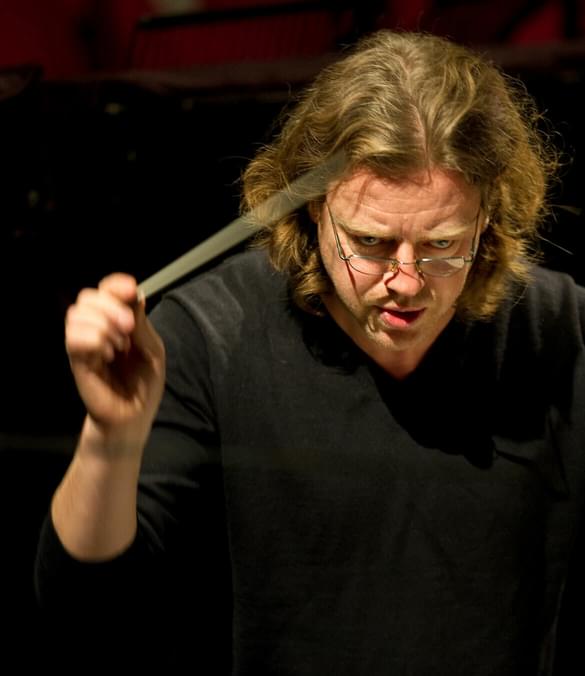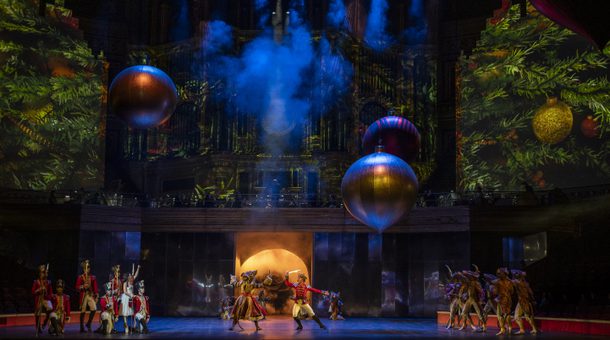News Story
In an article first published in The Sleeping Beauty programme, Mark Pullinger looks back at the extraordinary tenure of Music Director Koen Kessels in his final week as Music Director of Birmingham Royal Ballet.
‘Is that four, five or six highlights?’ Koen Kessels, Birmingham Royal Ballet’s departing Music Director, is running out of fingers counting the highlights of his 14-year tenure. Kessels took on the job in 2010, shortly after Barry Wordsworth had invited him to conduct BRB’s sister company, The Royal Ballet. ‘I had three performances with BRB and the Royal Ballet Sinfonia in Birmingham, so I first met the Company there. That was considered my audition and in June they asked if I could take on the job’.
Kessels departs to take up his new appointment at Dutch National Ballet. His time in Birmingham has been filled with joy. ‘It’s like a huge family,’ he explains, ‘and I’d like to thank the entire company so much: the dancers, ballet staff, music department, stage crews, costume department and stage management – who do such an incredible job.’
Touring the UK has been a revelation ‘to discover the country, the venues and to see how there’s a public out there that is hugely interested in classical ballet’.
For much of his tenure, the Company’s Director was David Bintley, and as Kessels reels off their achievements together, his admiration is obvious. ‘When we did Cinderella, we tried to be faithful to Prokofiev’s original tempi, which was very exciting. David was there with his metronome in the studio!’ Another Bintley collaboration dear to Kessels’ heart was The Tempest, working with composer Sally Beamish on her first ballet. ‘David’s musicality is wonderful. We discussed with Sally where she shouldn’t feel trapped by the ballet language. It turned into a huge event’.
BRB’s Ballet Now programme, supporting young choreographers, composers and designers, was another Bintley-Kessels collaboration. ‘There is a Spanish tapas bar at Birmingham’s central station,’ he begins. ‘I met David there for a quick tapas and a glass of wine… and I nearly missed the train three hours later! That discussion was the start of Ballet Now’.
The Ballet Now programme culminated with two of the three acts of the Company’s Black Sabbath – the Ballet, premiered last autumn. Alongside choreographers Pontus Lidberg, Cassi Abranches and Raúl Reinoso, composers Marko Nyberg and Sun Keting were mentored by Christopher Austin (who also wrote the third act), an established and experienced composer and arranger recommended by Koen.
If we want to have the name of a classical ballet company, we should insist on a full live orchestra.
Bringing young conductors into ballet is an ongoing passion and Kessels is enormously proud of the Constant Lambert Fellowship, the programme for young conductors that is a collaboration between BRB and The Royal Ballet. ‘I came into ballet by accident,’ he explains. ‘I started out as an opera répétiteur. At the Flemish Opera, when I was an assistant conductor, the music director wasn’t available, so I was asked to step in and conduct my first ballet’.
‘It was time to motivate young conductors to want to conduct ballet, which is often seen as a ‘Cinderella’ behind symphonic conducting or opera. When all else fails, you go to the ballet.’ The programme is clearly bearing fruit. One of the first participants, Jonathan Lo, is now Music Director at Australian Ballet! Word has spread and competition for places is strong. ‘When Paul Murphy and I gathered together the latest round of auditions, we had 99 applicants for just two positions!’
But ballet conductors would be nothing without an orchestra and Kessels praises the Royal Ballet Sinfonia, citing the increase in the level of its performances, but also the importance of ‘protecting the sheer existence of an orchestra’. At a time when pressure is on companies to reduce their orchestras – or scrap them altogether – Kessels is adamant. ‘If we want to have the name of a classical ballet company, we should insist on a full live orchestra.’
‘It’s very strange for me to leave the Company. The orchestra is improving all the time and the Company looks to a better future. But it’s a good ending and the contact will stay. My directorships in London and Amsterdam will see me freelancing less but I will certainly be coming back.’




